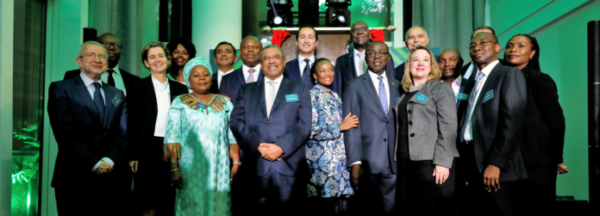On September 14, the pan-African infrastructure investment fund Africa 50 inaugurated its headquarters in the marina district of Casablanca, the Moroccan economic capital, at the end of the tour of its director general Alain Elibossé. Representatives from the private sector and the Moroccan government have been keen to accompany this launch, which also highlights Morocco’s ambitions for the continent.
Africa 50’s challenge to bring major infrastructure projects to the fore, on the continent, with public and private funding, is converging with the will of certain states to strengthen regional economic integration. Africa 50 launched by 23 African countries – today they are 27 Member States – two central banks – UEMOA and Morocco – and the African Development Bank has confirmed commitments totaling 830 million US dollars which allow it to intervene on infrastructure projects. The Moroccan government announces the fund to add up to 100 million US dollars plus 20 million US dollars from the national central bank. After being “incubated” by the African Development Bank Africa 50 is now on its own, targeting “drivers for economic and social transformation in Africa”: electric power, transport, information technology and communication and gas. According to Alain Elibossé, Africa 50 will intervene preferably on projects that bring an “inter-regional added value”.
A strategy focused on the profitability of projects
Prior to this official launch, Carole Wainana, the fund’s chief operating officer, told us that “there is a new awareness on the continent of this need for regional integration: the Free Trade Area. has just been signed, some regional organizations have adopted regional passports … “. Heads of State have also realized that the lack of infrastructure severely handicaps the continent’s potential. Africa 50, initiated at the 18th AU Summit in 2012, has succeeded in making this call and creating an African financing vehicle exclusively dedicated to infrastructure. In addition to the aforementioned sectors, Africa 50 will also seek to develop projects “in which Africa has a real comparative advantage”, for example in solar energy, for renewable energies. The operational team made up of executives from the private sector and other international financial organizations designed their scope of intervention at different levels of each project: the Africa 50 project development team for the design of the financing plan and the technical support; and Africa50 Project Finance for equity participation or co-financing of projects.
Two professions for a strategy
These two complementary teams act on the same guideline: designing and financing profitable projects, eligible for other investors, a prerequisite for their achievement. According to Carole Wainana, “the annual investment deficit in infrastructure reaches $ 30 billion annually on the continent and yet there is capital available on the markets that can be mobilized on profitable projects”. The surface of the investments necessary for the realization of large infrastructures sometimes exceeds the capacities of the African financial actors, rare on the niche of the infrastructures which also requires long term bets. Africa 50 will secure a start and the fund wants to become a true label of quality with the European and American capital markets, in order to mobilize co-financiers. A first portfolio of projects exceeding US $ 200 million has been selected by Africa 50 to launch its operations; the fund would invest in each 30% of the total project on average with the objective of securing accessible financing for private or public promoters through the mobilization of concessional credit lines. These first choices, which will be revealed as the rounds of projects are completed, have been made with great rigor, according to the fund’s executives, to send signals of confidence to the markets.
State ownership and private logic
Like the AfDB, a veritable pan-African institution, the 27 African board member states sit on the board of directors of Africa 50. Alongside them, independent personalities, often from the private sector, have been chosen to balance the board. and ensure the involvement of private actors in the work of the fund. In order to avoid any “political capture” of the fund’s priorities, the board of directors has also delegated to a technical body, the investment committee, the final decision-making power regarding the fund’s commitment. The members of the board are also called to a three-year renewal which will allow a significant rotation mitigating the games of influence and will allow to associate more actors around the priorities of the fund. The general director of Africa 50, Alain Elibossé, formerly of IFC, a subsidiary of the World Bank, specialized in infrastructure financing, will chair the investment committee, the sole decision-maker on investment choices. Mr. Elibossé, before the inauguration of the fund was able to meet with the Minister of Economy and Finance of Morocco, Mohamed Benchaaboun and the head of government Saad Eddine Othmani to discuss the Moroccan priorities in terms of infrastructure. He also welcomed the “welcome from the Moroccan authorities” who openly plan to participate in continental megaprojects including a Morocco-Nigeria gas pipeline or a West African motorway network.
Morocco, rewarded for its African activism
Obviously, Morocco welcomes the choice of location of Africa 50. The country wishing to develop its economic relations with West Africa is a candidate for entry into ECOWAS and wants to build new logistics routes with the countries of the region, whether in electrical, road or gas interconnection. During his speech, the president of the CGEM, the Confederation of Moroccan Enterprises, Salaheddine Mezouar, former Minister of Finance and Minister of Foreign Affairs, welcomed the country won the decision to host the headquarters of Africa50 , which has also been awarded the “Casablanca Finance City (CFC)” label allowing regulatory flexibility to international organizations and companies in their recruitment and investment operations on the African continent. Newly elected head of the CGEM, Mezouar will wish to mark its mandate the economic relations of Moroccan entrepreneurs to Africa. Othman El Ferdaous, Moroccan secretary of state, in charge of investment, emphasized the advantages of Casablanca as a regional bridgehead for international groups.



